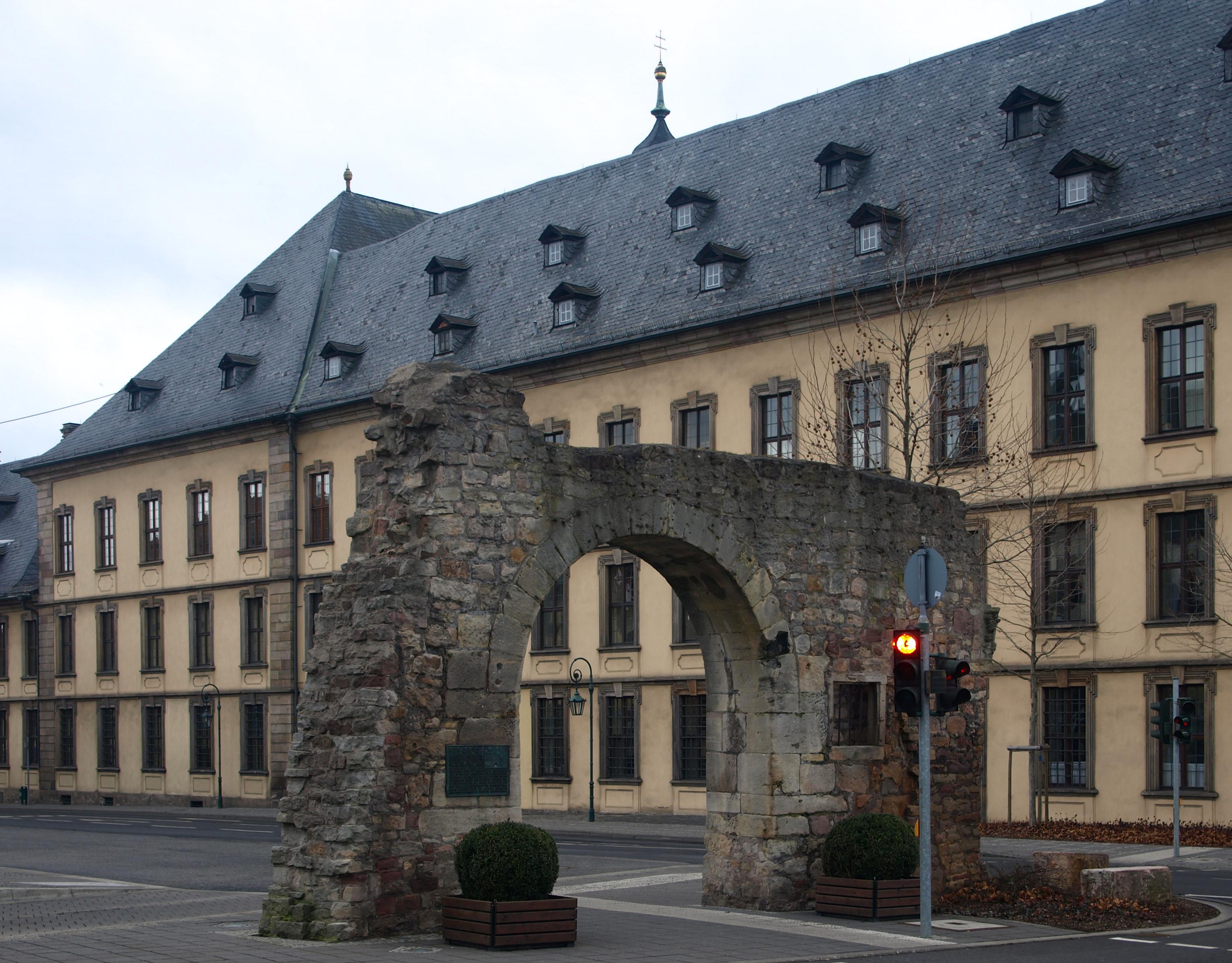|
Oberleichtersbach
Oberleichtersbach is a municipality in the district of Bad Kissingen in Bavaria in Germany. Divisions of the municipality The municipality includes the following towns: *Oberleichtersbach *Unterleichtersbach *Modlos *Breitenbach *Mitgenfeld History In 1803 the Bishopric of Fulda, of which Oberleichtersbach was a part, was secularized and given to Willem Frederik, Prince of Orange-Nassau. In 1806, after his defeat at the Battle of Jena–Auerstedt, the Principality of Nassau-Orange-Fulda was absorbed into France and its vassal state Grand Duchy of Frankfurt The Grand Duchy of Frankfurt was a German satellite state of Napoleonic creation. It came into existence in 1810 through the combination of the former territories of the Archbishopric of Mainz along with the Free City of Frankfurt itself. Histo .... In the Congress of Vienna in 1815, it was given to Bavaria. Population Coat of arms Quartered with 1 and 4 in silver with a cross; 2 and 3 divided diagonally gold and red. ... [...More Info...] [...Related Items...] OR: [Wikipedia] [Google] [Baidu] |
Bad Kissingen (district)
Bad Kissingen is a ''Landkreis'' (district) in Bavaria, Germany. It is bounded by (from the northwest and clockwise) the district Main-Kinzig and Fulda in Hesse, and the districts of Rhön-Grabfeld, Schweinfurt and Main-Spessart. History The district was established in 1972 by merging the former districts of Bad Kissingen, Bad Brückenau and Hammelburg. Geography The district is located in the southern portion of the Rhön Mountains. The Fränkische Saale river (an affluent of the Main) enters the district in the north and leaves to the southwest. Coat of arms The coat of arms displays: * top: three icons symbolising the three spas of the district * left: the eagle as well as the red and white pattern are from the arms of the county of Henneberg, which ruled the territory in the Middle Ages * right: the cross from the arms of Fulda Fulda () (historically in English called Fuld) is a city in Hesse, Germany; it is located on the river Fulda and is the administrative s ... [...More Info...] [...Related Items...] OR: [Wikipedia] [Google] [Baidu] |
Ortsteil
A village is a human settlement or Residential community, community, larger than a hamlet (place), hamlet but smaller than a town with a population typically ranging from a few hundred to a few thousand. Although villages are often located in rural areas, the term urban village is also applied to certain urban neighborhoods. Villages are normally permanent, with fixed dwellings; however, transient villages can occur. Further, the dwellings of a village are fairly close to one another, not scattered broadly over the landscape, as a dispersed settlement. In the past, villages were a usual form of community for societies that practice subsistence agriculture and also for some non-agricultural societies. In Great Britain, a hamlet earned the right to be called a village when it built a Church (building), church. [...More Info...] [...Related Items...] OR: [Wikipedia] [Google] [Baidu] |
Bayerisches Landesamt Für Statistik
The statistical offices of the German states (German language, German: ) carry out the task of collecting official statistics in Germany together and in cooperation with the Federal Statistical Office of Germany, Federal Statistical Office. The implementation of statistics according to Article 83 of the Basic Law for the Federal Republic of Germany, constitution is executed at state level. The Bundestag, federal government has, under Article 73 (1) 11. of the constitution, the exclusive legislation for the "statistics for federal purposes." There are 14 statistical offices for the States of Germany, 16 states: See also * Federal Statistical Office of Germany References {{Reflist National statistical services, Germany Lists of organisations based in Germany, Statistical offices Official statistics, Germany ... [...More Info...] [...Related Items...] OR: [Wikipedia] [Google] [Baidu] |
Municipalities Of Germany
MunicipalitiesCountry Compendium. A companion to the English Style Guide European Commission, May 2021, pages 58–59. (, ; singular ) are the lowest level of official territorial division in . This can be the second, third, fourth or fifth level of territorial division, depending on the status of the municipality and the '''' (federal state) it is part of. The city-states Berlin, Brem ... [...More Info...] [...Related Items...] OR: [Wikipedia] [Google] [Baidu] |
Bavaria
Bavaria, officially the Free State of Bavaria, is a States of Germany, state in the southeast of Germany. With an area of , it is the list of German states by area, largest German state by land area, comprising approximately 1/5 of the total land area of Germany, and with over 13.08 million inhabitants, it is the list of German states by population, second most populous German state, behind only North Rhine-Westphalia; however, due to its large land area, its population density is list of German states by population density, below the German average. Major cities include Munich (its capital and List of cities in Bavaria by population, largest city, which is also the list of cities in Germany by population, third largest city in Germany), Nuremberg, and Augsburg. The history of Bavaria includes its earliest settlement by Iron Age Celts, Celtic tribes, followed by the conquests of the Roman Empire in the 1st century BC, when the territory was incorporated into the provinces of Ra ... [...More Info...] [...Related Items...] OR: [Wikipedia] [Google] [Baidu] |
Germany
Germany, officially the Federal Republic of Germany, is a country in Central Europe. It lies between the Baltic Sea and the North Sea to the north and the Alps to the south. Its sixteen States of Germany, constituent states have a total population of over 84 million in an area of , making it the most populous member state of the European Union. It borders Denmark to the north, Poland and the Czech Republic to the east, Austria and Switzerland to the south, and France, Luxembourg, Belgium, and the Netherlands to the west. The Capital of Germany, nation's capital and List of cities in Germany by population, most populous city is Berlin and its main financial centre is Frankfurt; the largest urban area is the Ruhr. Settlement in the territory of modern Germany began in the Lower Paleolithic, with various tribes inhabiting it from the Neolithic onward, chiefly the Celts. Various Germanic peoples, Germanic tribes have inhabited the northern parts of modern Germany since classical ... [...More Info...] [...Related Items...] OR: [Wikipedia] [Google] [Baidu] |
Bishopric Of Fulda
Fulda () (historically in English called Fuld) is a city in Hesse, Germany; it is located on the river Fulda and is the administrative seat of the Fulda district (''Kreis''). In 1990, the city hosted the 30th Hessentag state festival. History Middle Ages In 744 Saint Sturm, a disciple of Saint Boniface, founded the Benedictine monastery of Fulda as one of Boniface's outposts in the reorganization of the church in Germany. The initial grant for the abbey was signed by Carloman, Mayor of the Palace in Austrasia (in office 741–47), the son of Charles Martel. The support of the Mayors of the Palace, and later of the early Pippinid and Carolingian rulers, was important to Boniface's success. Fulda also received support from many of the leading families of the Carolingian world. Sturm, whose tenure as abbot lasted from 747 until 779, was most likely related to the Agilolfing dukes of Bavaria. Fulda also received large and constant donations from the Etichonids, a leading famil ... [...More Info...] [...Related Items...] OR: [Wikipedia] [Google] [Baidu] |
William I Of The Netherlands
William I (Willem Frederik; 24 August 1772 – 12 December 1843) was King of the Netherlands and List of monarchs of Luxembourg, Grand Duke of Luxembourg from 1815 until his abdication in 1840. Born as the son of William V, Prince of Orange, the last stadtholder of the Dutch Republic, and Wilhelmina of Prussia, Princess of Orange, Wilhelmina of Prussia, William experienced significant political upheavals early in life. He fought against the French invasion during the Low Countries theatre of the War of the First Coalition, Flanders campaign, and after the Batavian Revolution in 1795, his family went into exile. He briefly ruled the Principality of Nassau-Orange-Fulda before Napoleon's French troops' occupation forced him out of power. Following the defeat of Napoleon in 1814, William was invited back to the Netherlands, where he proclaimed himself Sovereign Prince of the United Netherlands. In 1815, William raised the Netherlands to a kingdom and concurrently became the gran ... [...More Info...] [...Related Items...] OR: [Wikipedia] [Google] [Baidu] |
Battle Of Jena–Auerstedt
The twin battles of Jena and Auerstedt (; older spelling: ''Auerstädt'') were fought on 14 October 1806 on the plateau west of the river Saale in today's Germany, between the forces of Napoleon I of France and Frederick William III of Prussia, at the outset of the War of the Fourth Coalition during the Napoleonic Wars. The defeat suffered by the Prussian Army subjugated the Kingdom of Prussia to the French Empire until the Sixth Coalition was formed in 1813. Several figures who were later integral to the reformation of the Prussian Army participated at Jena–Auerstedt, including Gebhard von Blücher, Carl von Clausewitz, August Neidhardt von Gneisenau, Gerhard von Scharnhorst, and Hermann von Boyen. Background Following the Prussian declaration of war, Napoleon initiated his campaign against the Fourth Coalition by thrusting a 180,000-strong force through the Franconian Forest. The Prussian army, meanwhile, awaited Napoleon's advance with a force composed of about 1 ... [...More Info...] [...Related Items...] OR: [Wikipedia] [Google] [Baidu] |
Principality Of Nassau-Orange-Fulda
Nassau-Orange-Fulda (sometimes also named ''Fulda and Corvey'') was a short-lived principality of the Holy Roman Empire from 1803 to 1806. It was created for William Frederick, the son and heir of William V, Prince of Orange, the ousted stadtholder of the abolished Dutch Republic after the Batavian Revolution of 1795. Background The Princely Abbey of Fulda was elevated to Prince-Bishopric in 1752. In January 1795, stadtholder William V lost all his possessions in the Low Countries because of the rise of the Batavian Republic, a client state of the French Republic. During the Batavian Revolution in Amsterdam on 18 January 1795, he fled to England, and issued the Kew Letters in February 1795, ordering all officials in the Dutch colonies outside Europe to treat the British as their new overlords. In August 1799, he and his son William Frederick issued a proclamation in support of the Anglo-Russian invasion of Holland. After this failure, his son convinced him to issue the Ora ... [...More Info...] [...Related Items...] OR: [Wikipedia] [Google] [Baidu] |
Grand Duchy Of Frankfurt
The Grand Duchy of Frankfurt was a German satellite state of Napoleonic creation. It came into existence in 1810 through the combination of the former territories of the Archbishopric of Mainz along with the Free City of Frankfurt itself. History Frankfurt lost its status as a free imperial city in 1806 with the dissolution of the Holy Roman Empire. The city was granted to the former archbishop of Mainz, Karl Theodor Anton Maria von Dalberg, and became the Principality of Frankfurt. When Dalberg was forced by Napoleon to relinquish his Principality of Regensburg to the Kingdom of Bavaria in 1810, his remaining territories of Principality of Aschaffenburg, Aschaffenburg, County of Wetzlar, Wetzlar, Principality of Nassau-Orange-Fulda, Fulda, County of Hanau, Hanau, and Frankfurt were combined into the new Grand Duchy of Frankfurt. Although the grand duchy was named after Frankfurt, the city was administered by French commissioners while Dalberg resided in the city of Aschaffenb ... [...More Info...] [...Related Items...] OR: [Wikipedia] [Google] [Baidu] |



